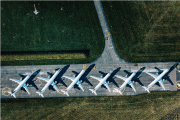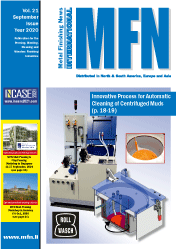The aviation industry is living through what can only be described as a stunning singularity. With fleets remaining grounded and the global pandemic marching on, aircraft manufacturers and MROs are operating (or not operating) under conditions of mind-boggling uncertainty. Here, we talk to Wheelabrator’s global airblast team on why they are continuing to build subcontract peening capacity in the UK and how this could offer a flexible way back for MROs.
Yves Dufour directs Wheelabrator’s Global Air team as Senior Vice President, while Tony Grammauro is VP in charge of Wheelabrator Impact Finishers. Both workextensively with the global aviation industry, delivering super-high-spec, critical peening processes in the form of equipment, support and subcontract work.
(?) MFN: Yves, could you start by giving us your take on the current situation in aerospace and its challenges.
(!) Y. D.: Understandably, the sector is incredibly cautious. As a specialist OEM into the aircraft manufacturing market, we can see already that capital investment in equipment will be largely on-hold for some time and cost control will be vital.
For MROs the picture, as we all know, is even bleaker. The latest estimates that have been reported anticipate a fall in 2020 revenue for MROs of 60-70%. Unfortunately, I can’t see the MRO industry weathering this without substantial job losses, and we’re already starting to see some of that.
(!) T. G.: If I may chip in here, this is going to be a huge issue across the industry. Job cuts mean a loss of specialist skills that may not be easily reversible. And if some of this happens through early retirement of highly skilled technicians, which is of course much better for the people involved, you do lose the most experienced part of your workforce, which is vital for niche processes.
Before the pandemic, everybody was getting ready for a huge increase in the global commercial aircraft fleet over the next decade and capacity and skills would have been a real problem. Now it’s suddenly all about rapidly scaling down while retaining the ability to scale up again.
A big challenge for MROs and manufacturers alike will be to manage access to the right skills and do that in a way that is flexible and sustainable. They’ll also have to look long and hard at what types of processes they need to keep in-house and what can be outsourced for added flexibility.
(?) MFN: Where does shot peening sit on that spectrum, do you think?
(!) Y. D.: Over the last couple of years, peening requirements for certain types of aerospace parts have been getting more and more high-spec, to the point that aircraft manufacturers were already struggling to deliver the process in-house.
That’s where Tony and I would work together to deliver equipment, expertise, training and support as a package, so customers would essentially buy the process from us, rather than just the kit. But for parts that are more readily shippable, I can easily see the process being outsourced to subcontractors on a larger scale. There are of course, applications that will remain difficult or impossible to give to external contractors. Wing peening at the aircraft manufacturer is a good example.
(!) T. G.: I agree with Yves. In a way, due to the scale up we were all initially anticipating, manufacturers and MROs would have needed extra peening capacity anyway, so now they may outsource it for different reasons, but they will have thought about it before and we, who as a business offer subcontract shot peening, have certainly prepared for it.
It’s also become such a specialist skill that it can make more sense to outsource to an expert rather than try and build and retain that knowledge internally. And peening won’t be the only process in the making, maintaining and repair of an aircraft that this applies to. There’s a lot of scope to outsource wisely. Especially for MROs, I think this is a really good option in finding a path to the future, and resetting to much leaner, more agile organisations.
(?) MFN: But is there sufficient capacity to serve this potential demand, even assuming a slower restart?
(!) T. G.: There are two things at play here. On the one hand, yes, the demands on aerospace peening processes have become so high-spec that not that many people can deliver it at scale. On the other hand, capacity has been built up recently in anticipation of greater demand.
For example, we have significantly upgraded our UK facilities last year and are adding further capacity at the moment.
(!) Y. D.: And don’t forget that what may be an incredibly advanced, tricky process challenge for mere mortals is routine for Tony and his team. There’s a lot of state-of-the-art process control and automation technology that’s gone into our UK operations, and that will help us achieve absolute repeatability and stability at volume.
It’s also worth saying that, as we come out of this, there are ways of delivering the process out of the box at a customer’s site, to augment subcontracting as volumes increase. We’ll be looking at innovative new models of supporting customers and, by virtue of being part of a substantial group, we have the network, resources and capacity for innovation that enables us to be highly flexible.
(?) MFN: What else is there to consider, looking at the next few quarters?
(!) Y. D.: I suppose, we have talked a lot about outsourcing, but for those organisations that do have airblast equipment in-house, it can make sense to prepare and remodel it for the new world, especially if capex for new machines remains limited. We’ve got quite a few innovations in the pipeline or ready to go, especially for aerospace, that will help with process control, operating cost and traceability. It’s as simple as upgrading key wear parts for a longer service life, so you have a longer period of operation when things pick up again. These are relatively small investments that deliver a big impact.
(!) T. G.: I’d second Yves’ suggestion there. A few months ago, I probably would have said that MROs should prepare for a spike in activity as restrictions are lifted. I am now not sure it is going to happen like that. I would venture the guess that we’re looking at a slower, but steady climb back up to cruising altitude, maybe with a few regional exceptions. So getting your house in order with maintenance and upgrades, using subcontracting where appropriate, seems sensible.
Hopefully, this will allow us all to see a new global aviation industry take shape before our eyes and adapt to its new needs and challenges. We’re ready.
(?) MFN: Yves, Tony – thank you for your time!
MFN would like to thank Yves Dufour and Tony Grammauro for this interview!
For Information:
Wheelabrator Group SAS (Charleville)
24 Rue Camille Didier, 08000, France
Charleville Mezieres
Tel. +33.3.24 33 63 00
Fax +33.3.24 33 63 27
E-mail: contact.fr@noricangroup.com
www.wheelabratorgroup.com/airblast































